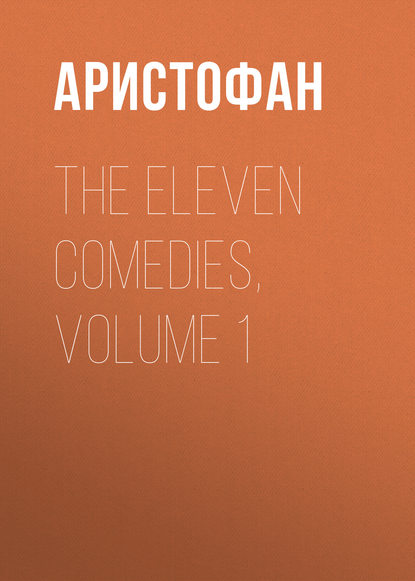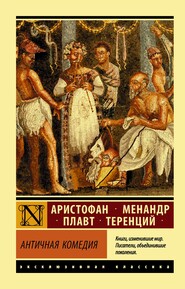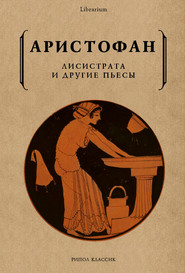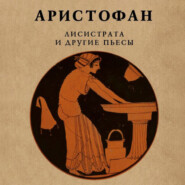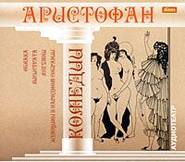По всем вопросам обращайтесь на: info@litportal.ru
(©) 2003-2024.
✖
The Eleven Comedies, Volume 1
Автор
Год написания книги
2018
Настройки чтения
Размер шрифта
Высота строк
Поля
MYRRHINÉ. You are joking!
CINESIAS. Deuce take the man who first invented perfumes, say I!
MYRRHINÉ (coming back with another flask). Here, take this bottle.
CINESIAS. I have a better all ready for your service, darling. Come, you provoking creature, to bed with you, and don't bring another thing.
MYRRHINÉ. Coming, coming; I'm just slipping off my shoes. Dear boy, will you vote for peace?
CINESIAS. I'll think about it. (Myrrhiné runs away.) I'm a dead man, she is killing me! She has gone, and left me in torment! I must have someone to fuck, I must! Ah me! the loveliest of women has choused and cheated me. Poor little lad (addressing his penis), how am I to give you what you want so badly? Where is Cynalopex? quick, man, get him a nurse, do![452 - 'Dog-fox,' nickname of a certain notorious Philostratus, keeper of an Athenian brothel of note in Aristophanes' day.]
CHORUS OF OLD MEN. Poor, miserable wretch, baulked in your amorousness! what tortures are yours! Ah! you fill me with pity. Could any man's back and loins stand such a strain? His organ stands stiff and rigid, and there's never a wench to help him!
CINESIAS. Ye gods in heaven, what pains I suffer!
CHORUS OF OLD MEN. Well, there it is; 'tis her doing, that abandoned hussy!
CINESIAS. Nay, nay! rather say that sweetest, dearest darling.
CHORUS OF OLD MEN. That dearest darling? no, no, that hussy, say I! Zeus, thou god of the skies, canst not let loose a hurricane, to sweep them all up into the air, and whirl 'em round, then drop 'em down crash! and impale them on the point of his weapon!
A HERALD. Say, where shall I find the Senate and the Prytanes? I am bearer of despatches.
MAGISTRATE. But are you a man or a Priapus, pray?[453 - The god of gardens—and of lubricity; represented by a grotesque figure with an enormous penis.]
HERALD. Oh! but he's mighty simple. I am a herald, of course, I swear I am, and I come from Sparta about making peace.
MAGISTRATE. But look, you are hiding a lance under your clothes, surely.
HERALD. No, nothing of the sort.
MAGISTRATE. Then why do you turn away like that, and hold your cloak out from your body? Have you gotten swellings in the groin with your journey?
HERALD. By the twin brethren! the man's an old maniac.
MAGISTRATE. Ah, ha! my fine lad, why I can see it standing, oh fie!
HERALD. I tell you no! but enough of this foolery.
MAGISTRATE. Well, what is it you have there then?
HERALD. A Lacedaemonian 'skytalé.'[454 - A staff in use among the Lacedaemonians for writing cipher despatches. A strip of leather or paper was wound round the 'skytalé,' on which the required message was written lengthwise, so that when unrolled it became unintelligible; the recipient abroad had a staff of the same thickness and pattern, and so was enabled by rewinding the document to decipher the words.]
MAGISTRATE. Oh, indeed, a 'skytalé,' is it? Well, well, speak out frankly; I know all about these matters. How are things going at Sparta now?
HERALD. Why, everything is turned upside down at Sparta; and all the allies are half dead with lusting. We simply must have Pellené.[455 - A city of Achaia, the acquisition of which had long been an object of Lacedaemonian ambition. To make the joke intelligible here, we must suppose Pellené was also the name of some notorious courtesan of the day.]
MAGISTRATE. What is the reason of it all? Is it the god Pan's doing?
HERALD. No, but Lampito's and the Spartan women's, acting at her instigation; they have denied the men all access to their cunts.
MAGISTRATE. But whatever do you do?
HERALD. We are at our wits' end; we walk bent double, just as if we were carrying lanterns in a wind. The jades have sworn we shall not so much as touch their cunts till we have all agreed to conclude peace.
MAGISTRATE. Ha, ha! So I see now, 'tis a general conspiracy embracing all Greece. Go you back to Sparta and bid them send Envoys with plenary powers to treat for peace. I will urge our Senators myself to name Plenipotentiaries from us; and to persuade them, why, I will show them this. (Pointing to his erect penis.)
HERALD. What could be better? I fly at your command.
CHORUS OF OLD MEN. No wild beast is there, no flame of fire, more fierce and untameable than woman; the panther is less savage and shameless.
CHORUS OF WOMEN. And yet you dare to make war upon me, wretch, when you might have me for your most faithful friend and ally.
CHORUS OF OLD MEN. Never, never can my hatred cease towards women.
CHORUS OF WOMEN. Well, please yourself. Still I cannot bear to leave you all naked as you are; folks would laugh at me. Come, I am going to put this tunic on you.
CHORUS OF OLD MEN. You are right, upon my word! it was only in my confounded fit of rage I took it off.
CHORUS OF WOMEN. Now at any rate you look like a man, and they won't make fun of you. Ah! if you had not offended me so badly, I would take out that nasty insect you have in your eye for you.
CHORUS OF OLD MEN. Ah! so that's what was annoying me so! Look, here's a ring, just remove the insect, and show it me. By Zeus! it has been hurting my eye this ever so long.
CHORUS OF WOMEN. Well, I agree, though your manners are not over and above pleasant. Oh! what a huge great gnat! just look! It's from Tricorysus, for sure.[456 - A deme of Attica, abounding in woods and marshes, where the gnats were particularly troublesome. There is very likely also an allusion to the spiteful, teasing character of its inhabitants.]
CHORUS OF OLD MEN. A thousand thanks! the creature was digging a regular well in my eye; now it's gone, my tears flow freely.
CHORUS OF WOMEN. I will wipe them for you—bad, naughty man though you are. Now, just one kiss.
CHORUS OF OLD MEN. No—a kiss, certainly not!
CHORUS OF WOMEN. Just one, whether you like it or not.
CHORUS OF OLD MEN. Oh! those confounded women! how they do cajole us! How true the saying: "'Tis impossible to live with the baggages, impossible to live without 'em"! Come, let us agree for the future not to regard each other any more as enemies; and to clinch the bargain, let us sing a choric song.
CHORUS OF WOMEN. We desire, Athenians, to speak ill of no man; but on the contrary to say much good of everyone, and to do the like. We have had enough of misfortunes and calamities. Is there any, man or woman, wants a bit of money—two or three minas or so;[457 - A mina was a little over Ł4; 60 minas made a talent.] well, our purse is full. If only peace is concluded, the borrower will not have to pay back. Also I'm inviting to supper a few Carystian friends,[458 - Carystus was a city of Euboea notorious for the dissoluteness of its inhabitants; hence the inclusion of these Carystian youths in the women's invitation.] who are excellently well qualified. I have still a drop of good soup left, and a young porker I'm going to kill, and the flesh will be sweet and tender. I shall expect you at my house to-day; but first away to the baths with you, you and your children; then come all of you, ask no one's leave, but walk straight up, as if you were at home; never fear, the door will be … shut in your faces![459 - A [Greek: para prosdokian]; i.e. exactly the opposite of the word expected is used to conclude the sentence—to move the sudden hilarity of the audience as a finale to the scene.]
CHORUS OF OLD MEN. Ah! here come the Envoys from Sparta with their long flowing beards; why, you would think they wore a cage[460 - A wattled cage or pen for pigs.] between their thighs. (Enter the Lacedaemonian Envoys.) Hail to you, first of all, Laconians; then tell us how you fare.
A LACONIAN. No need for many words; you see what a state we are in.
CHORUS OF OLD MEN. Alas! the situation grows more and more strained! the intensity of the thing is just frightful.
LACONIAN. 'Tis beyond belief. But to work! summon your Commissioners, and let us patch up the best peace we may.
CHORUS OF OLD MEN. Ah! our men too, like wrestlers in the arena, cannot endure a rag over their bellies; 'tis an athlete's malady, which only exercise can remedy.
AN ATHENIAN. Can anybody tell us where Lysistrata is? Surely she will have some compassion on our condition.





